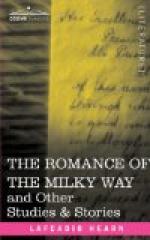* * * * *
In the conversation that followed I was not able to take part, as it related only to some question of title. The notary soon arranged whatever there was to arrange; and, after some charmingly spoken words of farewell from the gentle lady, we took our departure. Again the mummified negro hobbled before us, to open the gate,—followed by all his callow rabble of chickens. As we resumed our places in the carriage we could still hear the chippering of the creatures, pursuing after that ancient scarecrow.
“Is it African sorcery?” I queried.... “How does he bewitch those chickens?”
“Queer—is it not?” the notary responded as we drove away. “That negro must now be at least eighty years old; and he may live for twenty years more,—the wretch!”
The tone in which my friend uttered this epithet—le miserable!—somewhat surprised me, as I knew him to be one of the kindliest men in the world, and singularly free from prejudice. I suspected that a story was coming, and I waited for it in silence.
“Listen,” said the notary, after a pause, during which we left the plantation well behind us; “that old sorcerer, as you call him, was born upon the estate, a slave. The estate belonged to M. Floran,—the husband of the lady whom we visited; and she was a cousin, and the marriage was a love-match. They had been married about two years when the revolt occurred (fortunately there were no children),—the black revolt of eighteen hundred and forty-eight. Several planters were murdered; and M. Floran was one of the first to be killed. And the old negro whom we saw to-day—the old sorcerer, as you call him—left the plantation, and joined the rising: do you understand?”
“Yes,” I said; “but he might have done that through fear of the mob.”
“Certainly: the other hands did the same. But it was he that killed M. Floran,—for no reason whatever,—cut him up with a cutlass. M. Floran was riding home when the attack was made,—about a mile below the plantation.... Sober, that negro would not have dared to face M. Floran: the scoundrel was drunk, of course,—raving drunk. Most of the blacks had been drinking tafia, with dead wasps in it, to give themselves courage.”
“But,” I interrupted, “how does it happen that the fellow is still on the Floran plantation?”
“Wait a moment!... When the military got control of the mob, search was made everywhere for the murderer of M. Floran; but he could not be found. He was lying out in the cane,—in M. Floran’s cane!—like a field-rat, like a snake. One morning, while the gendarmes were still looking for him, he rushed into the house, and threw himself down in front of Madame, weeping and screaming, ’A[:i]e-ya[:i]e-ya[:i]e-ya[:i]e!—moin t[’e] tchou[’e] y! moin t[’e] tchou[’e] y!—a[:i]e-ya[:i]e-ya[:i]e!’ Those were his very words:—’I killed him! I killed him!’ And he begged for mercy. When he was asked why he killed M. Floran, he cried out that it was the devil—diabe-[`a]—that had made him do it!... Well, Madame forgave him!”




